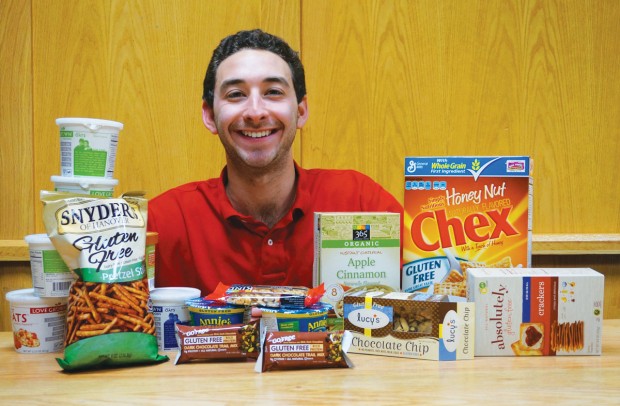To Be or Not to Be Gluten-Free


When Matthew Darlow is away at Duke University, it’s easy for him to stay gluten-free with so many products available today.
Name a diet, any diet. Grapefruit. Atkins. Cabbage Soup. At some point in the past three decades, I’ve tried them all. I know the Weight Watchers points of so many foods by heart that my brain is in constant tally mode.
So when friends started telling me they’d gone “gluten-free” and felt great and lost weight, I wondered. Maybe gluten is the magic trick? I started asking around.
What I learned is that opinions abound, even warranting a “Room for Debate” page in The New York Times’ Opinion Pages entitled, “Life After Gluten: For people who don’t suffer from celiac disease, is the gluten-free diet a fad or an innovative way to approach eating?” Ensuing titles range from “This Fad Too Shall Pass” to “It May Help Some Gastrointestinal Problems.”
Let’s backtrack a bit. Some people absolutely should be on a gluten-free diet. About one percent of Americans have an autoimmune disease called celiac disease, which presents as sensitivity to a protein in wheat called gluten. That protein, when ingested by someone suffering from celiac, inflames the lining of the intestine, preventing the person from absorbing nutrients, causing issues from gastrointestinal problems to rashes to joint pain. There’s a larger percentage – up to 10 percent – of the population suffering from “non-celiac gluten sensitivity.” These people, after eliminating gluten from their diets, report decreased fatigue, better skin and alleviated digestive issues.
Debbie Darlow’s 21-year-old son Matthew, a junior at Duke University, was diagnosed with a gluten sensitivity in middle school. Debbie’s father and her husband both suffer from gluten sensitivities, so she was already attuned to the issues. “It was very difficult,” Debbie says of keeping her family gluten-free. “Passing up pizza and bagels was a challenge, but when they make you sick, it is just something you have to do.”
When Matthew eliminated gluten from his diet, “he immediately grew four inches and gained 20 pounds,” Debbie says.
Consumer-research firms report that Americans will spend around $10 billion this year on foods labeled gluten-free, with 30 percent of us trying to cut back on gluten. Why? For some, it’s to look like Gwyneth Paltrow, who has made being gluten-free hot. For others it’s the lure of the fad. But for others, it’s about feeling good.
Debbie Mills is a yoga instructor and massage therapist who has been gluten-free since 2006. “I don’t have celiac,” she says. “I’ve never been tested. But that’s irrelevant because it wouldn’t change how I live my life. I don’t need a label.”
Debbie says that her gluten sensitivity presented as digestive issues and a distended abdomen. Having gone gluten-free, she can now tell immediately when she gets “poisoned” by gluten hidden in foods.
“My digestion is off for two to four weeks; my joints hurt. There’s a lot of hype about this, and generally I think trends are ridiculous,” she says. “I don’t think letting the media dictate our diets is a good idea.”
But because of the relief they’ve seen with gluten-free diets, both Debbie Darlow and Debbie Mills are thankful for the hype. “We almost feel normal,” Debbie Darlow says, acknowledging the myriad gluten-free products available now. “We were gluten-free before gluten-free was vogue. This may be consumerism at its finest, but at least now we have options.”
For those without gluten sensitivities, the experts are divided.
Ali Miller, registered dietician and owner of Naturally Nourished, says, “Everyone would benefit from reducing gluten in their diet. I recommend my clients use flour as a mindful indulgence rather than as everyday intake,” adding that even whole-wheat options are not fit diet staples. “Replace gluten products with vegetables like zucchini pasta or spaghetti squash filled with fiber and antioxidants, or nut flours filled with protein and healthy fat.”
But Kari Kooi, a clinical dietician specialist at Houston Methodist Wellness Services, says, “There is no scientific evidence that gluten is ‘bad’ for everyone or that going gluten-free can lead to weight loss or improved energy. Gluten is not harmful to those who are tolerant of it any more than nuts are harmful to people free of nut allergies.”
What both Ali and Kari do agree on, though, is that a gluten-free label does not always equivocate with healthy. “Often gluten-free products have more sugar and fat then their gluten-containing counterparts,” Kari says.
Which brings us back from the magic bullet and all its promises to what we knew all along: Just cleaning up a diet, eating lean proteins, fruits and veggies, and fewer processed foods, brings health benefits – and often weight loss. So much for short cuts.
Want more buzz like this? Sign up for our Morning Buzz emails.
To leave a comment, please log in or create an account with The Buzz Magazines, Disqus, Facebook, or Twitter. Or you may post as a guest.


